To visit - Zanzibar
Zanzibar is a semi-autonomous archipelago off the coast of Tanzania, in the Indian Ocean. It consists of several islands, with the main two being Unguja (commonly referred to as Zanzibar Island) and Pemba. Here are some key aspects of Zanzibar:
Historical Significance:
Zanzibar has a rich history influenced by Arab, Persian, Indian, and European cultures. Stone Town, the historic center of Zanzibar City, is a UNESCO World Heritage Site known for its narrow streets, old buildings, and vibrant markets.Cultural Fusion:
The cultural blend is evident in Zanzibar's architecture, cuisine, and way of life. The island has a diverse population, and its culture reflects a mix of African, Arab, Indian, and European influences.Spice Islands:
Zanzibar is often referred to as the "Spice Islands" due to its historical association with the spice trade. Visitors can explore spice farms to learn about the cultivation of cloves, vanilla, cinnamon, and other aromatic spices.Zanzibar's unique blend of history, culture, and natural beauty makes it a captivating destination for travelers seeking a tropical paradise with a touch of exotic charm. Whether exploring historic sites, enjoying water activities, or simply relaxing on the beaches, Zanzibar offers a diverse range of experiences.
The 11 essential things to do in Zanzibar :
Summary
- To visit
-
- 1 - Stone Town
- 2 - Nungwi and Kendwa beaches
- 3 - Mnemba Atoll
- 4 - Spice Island
- 5 - Pemba Island
- 6 - Jozani Forest
- 7 - Prison Island
- 8 - Scuba Diving and Snorkeling
- 9 - Kizimkazi village
- 10 - Deep sea fishing
- 11 - Sauti za Busara Festival
- Zanzibar - Where to Stay?
- Zanzibar - How to get around?
- Zanzibar - Best period
1 - Stone Town
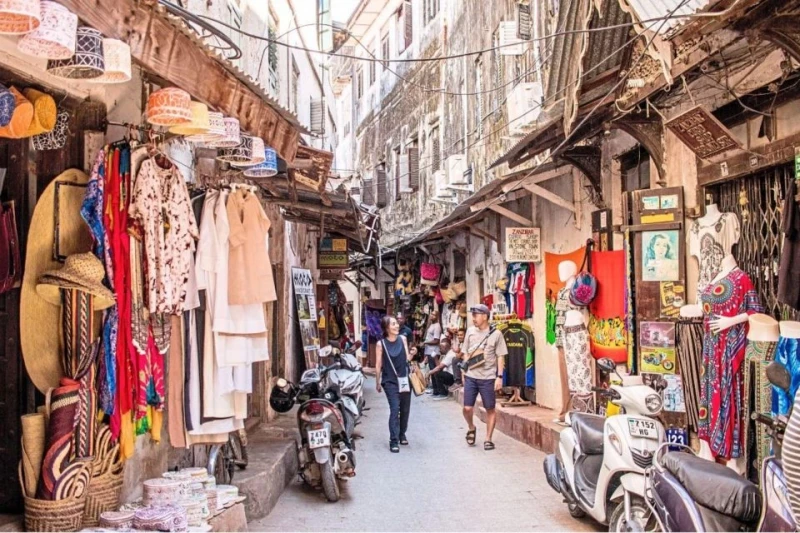
Stone Town, classified as a UNESCO World Heritage site, is the historical and cultural heart of Zanzibar. This picturesque old town is characterized by narrow alleys, coral buildings, intricately carved doors, and a fascinating atmosphere. Here are some highlights and activities to explore in Stone Town:
-
Forodhani Gardens: Enjoy a leisurely stroll in Forodhani Gardens in the evening, where you'll find local food stalls offering Swahili specialties, fresh seafood, and delicious snacks.
-
Old Fort (Fort Jozani): Visit the Old Fort, also known as Fort Jozani, a historic structure that played a key role in Zanzibar's history. Today, it hosts cultural events and art exhibitions.
-
House of Wonders (Beit-al-Ajaib): Explore the House of Wonders, one of the largest coral buildings in the world. It provides insights into Zanzibar's history through exhibits on culture, art, and local history.
-
Sultan's Palace (Beit el-Sahel): Visit the Sultan's Palace, also called Beit el-Sahel, which once served as the sultan's residence. Today, it houses a museum displaying historical artifacts.
-
Stone Town's Doors: Admire the famous carved wooden doors of Stone Town. Each door tells a unique story, with intricate patterns and details reflecting the wealth and social status of its owners.
-
Forodhani Night Market: Experience the Forodhani Night Market to sample local dishes such as Zanzibar pizza, grilled fish, fruit skewers, and other culinary delights.
-
House of Wonders (Beit-al-Ajaib): Explore the House of Wonders, a historic house that provides insights into Swahili architecture. Its name comes from a surprising story related to its owner.
-
Zanzibar Cathedral: Visit Christ Church, the Anglican cathedral built on the site of the former slave market. The cathedral's stained glass windows commemorate the end of the slave trade.
-
Darajani Market: Immerse yourself in the bustle of Darajani Market, where you can purchase local produce, spices, fruits, vegetables, and artisanal souvenirs.
-
Stroll Through Alleyways: Deliberately lose yourself in the narrow alleys of Stone Town to discover hidden treasures, local shops, art galleries, and intimate cafes.
By exploring Stone Town, you'll be immersed in Zanzibar's rich history, uncovering a unique blend of Arab, Indian, European, and African cultures that has shaped this extraordinary town.
 Our tips for getting the most out of your experience.
Our tips for getting the most out of your experience.
Visiting Stone Town in Zanzibar is an immersive experience with its historical architecture, winding alleyways, and unique cultural ambiance. Here are some tips to make the most of your visit to Stone Town:
-
Walk Around on Foot: Stone Town is a maze of narrow streets and pedestrian walkways. The best way to explore the town is by walking. This allows you to discover the most picturesque corners and immerse yourself in the local atmosphere.
-
Consider a Guided Tour: A guided tour can provide in-depth historical and cultural insights. Local guides can share fascinating stories about the buildings, carved doors, and the town's history.
-
Explore Darajani Market: Darajani Market is lively and offers a complete sensory experience. Explore the colorful stalls of spices, fruits, fish, and local crafts. Be prepared to haggle if you plan to make a purchase.
-
Visit Forodhani Night Market: Every evening, Forodhani Night Market comes alive with a variety of local dishes, from seafood grills to sweet specialties. It's a great opportunity to taste local cuisine.
-
Explore Craft Shops: Stone Town is filled with craft shops offering wood carvings, jewelry, traditional fabrics, and other souvenirs. Take the time to explore these shops to find unique items.
-
Appreciate Door Architecture: The doors of Stone Town are famous for their intricate carvings. Take the time to admire these doors, each with cultural and historical significance.
-
Visit Local Museums: Stone Town is home to several museums that trace the history of Zanzibar. Among them, the House of Wonders and the Sultan's Palace are worth visiting to understand the region's history.
-
Take a Dhow Cruise: Opt for a cruise on a traditional dhow from the waterfront. This provides a unique perspective of the town from the water and may include picturesque sunset views.
-
Taste Local Cuisine: Try local dishes in Stone Town's restaurants and cafes. Swahili cuisine is delicious, with influences from Arabic, Indian, and African flavors.
-
Respect Local Culture: Stone Town has a rich cultural history. Respect local traditions, ask for permission before taking photos of people, and dress modestly, especially when visiting religious sites.
By following these tips, you can fully enjoy the unique experience that Stone Town offers, discovering its history, vibrant culture, and picturesque charm.
2 - Nungwi and Kendwa beaches
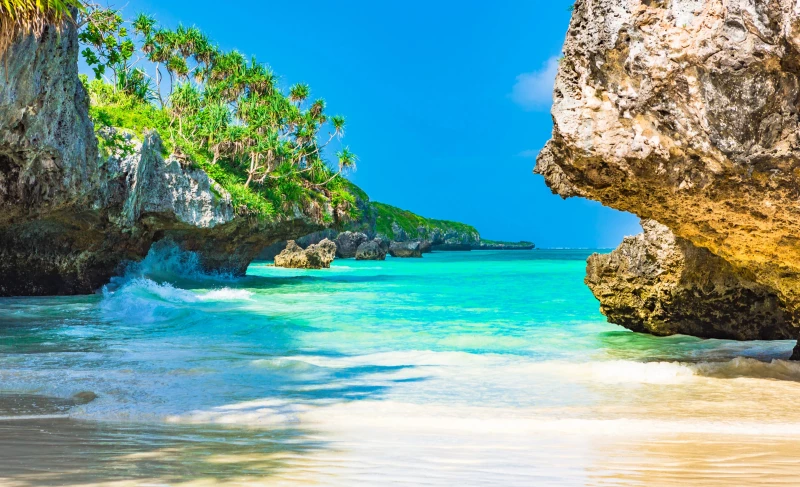
The beaches of Nungwi and Kendwa are among the most famous and beautiful in Zanzibar. Located on the north side of the island, these beaches offer crystal-clear waters, white sandy shores, and a relaxed atmosphere. Here's what you can do on the beaches of Nungwi and Kendwa:
-
Sunbathing and Relaxation: Soak up the tropical sun on the white sandy beaches. Nungwi and Kendwa provide expansive beach areas perfect for relaxation, reading a book, or simply enjoying the scenery.
-
Water Sports: Try various water activities offered on these beaches, such as snorkeling, scuba diving, jet-skiing, paddleboarding, and kayaking. The clear waters are perfect for exploring marine life.
-
Sunset at Kendwa: Kendwa is particularly renowned for its stunning sunsets. Settle down on the beach in the evening to witness the spectacle of the sun setting behind the horizon.
-
Boat Excursions: Arrange boat excursions from Nungwi to explore the surroundings. Some excursions may include deep-sea fishing, sunset cruises, or even traditional sailing trips.
-
Nightlife in Kendwa: Kendwa offers lively nightlife with beach bars and evening parties. It's the perfect place to socialize with other travelers and enjoy the laid-back atmosphere.
-
Visit Nungwi Village: Explore the Nungwi fishing village to get a glimpse of local daily life, visit the bustling fish market, and perhaps join a fishing excursion organized by the locals.
-
Beachside Massage: Indulge in a relaxing experience by treating yourself to a beachside massage. Some hotels and local services offer massage sessions with the soothing sound of waves in the background.
-
Nungwi Craft Market: Browse through the Nungwi craft market to purchase local souvenirs such as jewelry, wooden sculptures, clothing, and traditional crafts.
-
Diving Courses: If you're new to scuba diving, take advantage of opportunities to enroll in diving courses with reputable local dive centers.
-
Seafood Tasting: Enjoy fresh seafood in the beachfront restaurants lining Nungwi and Kendwa. Many of these establishments offer delicious dishes featuring local catches.
Whether you're looking for water activities, beach relaxation, or vibrant nightlife, the beaches of Nungwi and Kendwa in Zanzibar have something to cater to every preference.
 Our tips for getting the most out of your experience.
Our tips for getting the most out of your experience.
To make the most of your visit to Nungwi and Kendwa beaches in Zanzibar, here are some tips:
-
Sunset at Kendwa: Don't miss the spectacular sunsets at Kendwa. Ensure you find a comfortable spot on the beach to enjoy this daily natural spectacle.
-
Avoid Peak Seasons: If you prefer quieter beaches, try to plan your visit outside of peak tourist seasons. The beaches can be more peaceful during the low season.
-
Check Tide Times: Tides in Zanzibar can vary significantly. Check tide schedules to choose the best times for swimming and water activities.
-
Negotiate Water Activities: When considering water activities like snorkeling or jet-skiing, feel free to negotiate prices with local service providers.
-
Explore Beach Restaurants: Explore local beachfront restaurants to savor fresh seafood and local dishes. Some establishments also offer meals with ocean views.
-
Bring Beach Essentials: Make sure to bring essential items such as sunscreen, hats, and beach towels to protect yourself from the tropical sun.
-
Respect the Environment: Contribute to environmental preservation by avoiding littering on the beach. Use proper bins and adhere to guidelines for protecting the marine ecosystem.
-
Participate in Local Activities: Look for opportunities to engage in local activities, such as dance classes or cultural events, for a deeper immersion into local life.
-
Explore the Surroundings: Take the time to explore the areas around the beaches. Fishing villages, local markets, and cultural attractions may offer enriching experiences.
-
Book Accommodation in Advance: If you plan to stay in Nungwi or Kendwa, it can be advantageous to book your accommodation in advance, especially during peak periods.
-
Stay Hydrated: The tropical climate can be hot, so make sure to stay hydrated by drinking enough water, especially if you're participating in outdoor activities.
By following these tips, you can fully enjoy the beaches of Nungwi and Kendwa, creating memorable experiences in this paradise-like setting.
3 - Mnemba Atoll
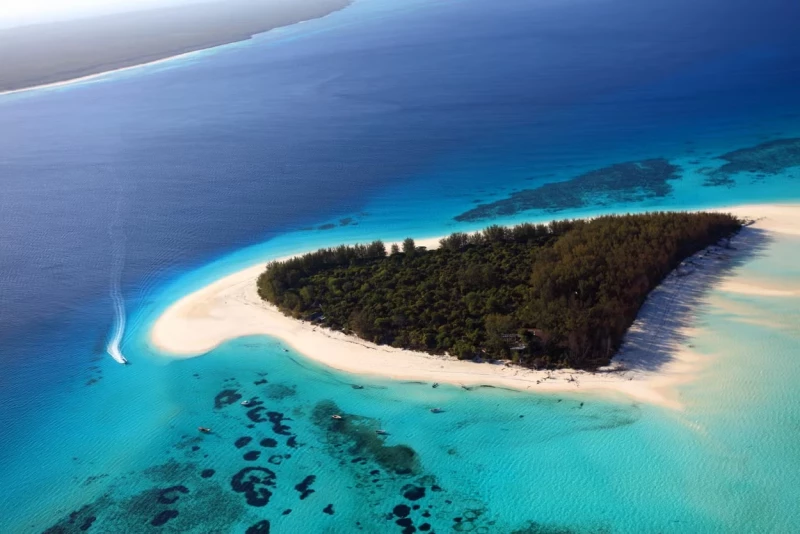
Mnemba Atoll is a small coral island located off the northeast coast of the main island of Unguja in Zanzibar, Tanzania. Here are some aspects and features of Mnemba Atoll:
-
Marine Reserve: Mnemba Atoll is a protected marine reserve, providing ideal conditions for snorkeling and scuba diving. The clear waters and preserved coral reefs make this location a sanctuary for a variety of marine life.
-
Scuba Diving: Divers appreciate the diving sites around Mnemba for their marine biodiversity. The area is home to a plethora of tropical fish, sea turtles, sharks, and sometimes even dolphins.
-
White Sand Beaches: The beaches surrounding Mnemba are known for their fine white sand and turquoise waters. It's an ideal spot for relaxation, strolls along the shore, and water activities.
-
Marine Ecosystem: Mnemba is home to a rich marine ecosystem with a variety of hard and soft corals. Snorkelers can explore colorful coral gardens, while experienced divers can venture into deeper spots.
-
Marine Wildlife Observation: Visitors to Mnemba have the opportunity to observe an impressive diversity of marine creatures, including colorful fish, rays, turtles, and reef sharks.
-
Private Island: Mnemba Atoll houses an exclusive luxury resort. The island itself is not accessible to the general public, except for resort guests, ensuring a more secluded and private experience.
-
Marine Conservation: Due to its marine reserve status, Mnemba Atoll is subject to strict conservation measures to preserve its fragile ecosystem. This includes responsible diving practices and environmental awareness efforts.
-
Water Activities: In addition to diving, visitors can enjoy water activities such as kayaking, sailing, and deep-sea fishing in the vicinity of the atoll.
Mnemba Atoll is renowned for providing an exclusive resort experience coupled with preserved marine nature. It is a preferred choice for travelers seeking tranquility, natural beauty, and underwater exploration.
4 - Spice Island

Zanzibar's Spice Island, also known as Unguja, is an island in the Zanzibar Archipelago located off the east coast of Africa in Tanzania. Here are some aspects of Zanzibar's Spice Island:
-
Spice History: Zanzibar is renowned for its spice plantations, including cinnamon, cloves, black pepper, cardamom, and vanilla. These crops have historically played a crucial role in the island's economy.
-
Spice Plantation Tours: Visitors can take guided tours of spice plantations to learn about the cultivation, harvesting, and processing of spices. These tours offer an immersive sensory experience.
-
Local Markets: Explore Zanzibar's local markets to discover a variety of fresh spices, as well as other local products such as tropical fruits, seafood, and crafts.
-
Traditional Villages: Enjoy your visit by exploring traditional villages where you can observe the daily life of the inhabitants, often centered around agriculture and fishing.
-
Paradisiacal Coastline: Apart from spice plantations, Zanzibar is famous for its paradisiacal beaches. White sandy beaches and turquoise waters provide an ideal setting for relaxation and water activities.
-
Stone Town: The UNESCO World Heritage site of Stone Town is a historic center that blends Arab, Indian, European, and African influences. Explore its narrow streets, markets, and historical sites.
-
Cultural and Local Traditions: Immerse yourself in local cultures and Swahili traditions. Attend traditional dance performances, taste local cuisine, and experience the warm hospitality of the locals.
-
Mnemba Marine Reserve: Nearby, the Mnemba Atoll offers exceptional opportunities for snorkeling and scuba diving in crystal-clear waters surrounding a preserved marine reserve.
-
Neighboring Islands: Explore nearby islands such as Prison Island and Changuu Island, which are home to giant tortoises and offer fascinating excursions.
-
Swahili Architecture: Admire the unique Swahili architecture in Stone Town with its carved doors, wooden balconies, and ancient houses. The town provides an immersion into the history of Zanzibar.
Whether for spices, idyllic beaches, or cultural history, Zanzibar's Spice Island offers a variety of captivating experiences for travelers.
 Our tips for getting the most out of your experience.
Our tips for getting the most out of your experience.
To make the most of your visit to Zanzibar's Spice Island, here are some tips:
-
Spice Plantation Tours: Book a guided tour of a spice plantation to learn about the cultivation, harvesting, and uses of spices. These tours often provide a sensory experience with taste and smell demonstrations.
-
Choose the Right Season: Some times of the year may be more conducive to visiting spice plantations based on harvest seasons. Inquire about the best time to visit according to your preferences.
-
Local Guides: Opt for guided tours with local residents. Local guides can share in-depth knowledge about spice history, local culture, and traditions.
-
Be Adventurous: Don't hesitate to taste fresh spices during the tour. Some guides will show you how to extract flavors from spices and allow you to taste them directly from the plants.
-
Explore Local Markets: Enhance your experience by exploring Zanzibar's local markets. You'll find a variety of fresh spices, as well as other local products and souvenirs.
-
Appropriate Attire: Wear light and comfortable clothing, especially if visiting spice plantations in warm weather. A hat and sunscreen may also be beneficial.
-
Cultural Exchange: Take the opportunity to engage with local residents. Ask questions about their daily life, traditions, and how they use spices in local cuisine.
-
Photograph with Caution: Ask for permission before taking photos, especially of people. Be respectful of the privacy of local residents.
-
Visit Stone Town: Complete your experience by exploring Stone Town, where you can see the influence of spices in architecture, markets, and local dishes.
-
Responsible Shopping: If you plan to buy spices as souvenirs, ensure they are purchased ethically and sustainably, supporting local communities.
-
Learn a Few Swahili Words: Learning a few greetings and expressions in Swahili can enrich your experience and show respect for the local culture.
By following these tips, you can have an immersive and educational experience during your visit to Zanzibar's Spice Island, discovering the cultural and natural richness of this unique destination.
5 - Pemba Island
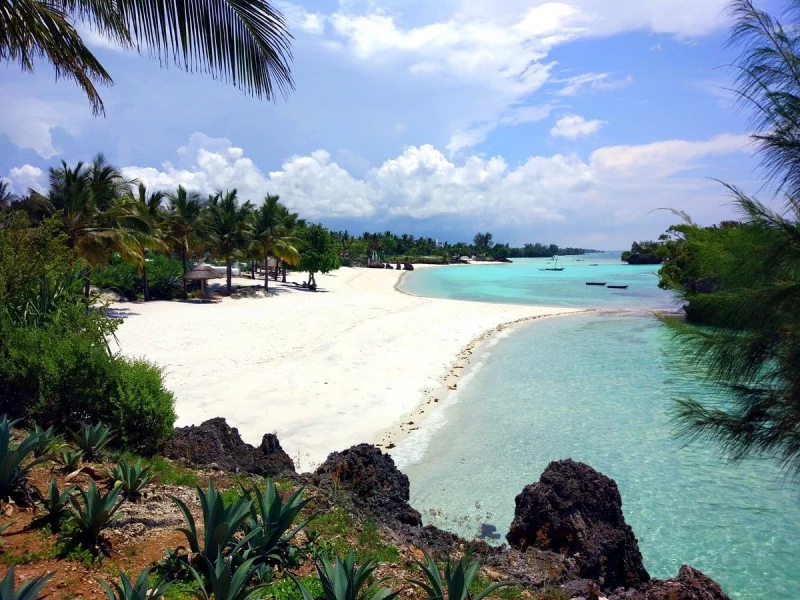
Pemba Island is the second-largest island in the Zanzibar Archipelago, located off the east coast of Africa in Tanzania. Here are some aspects of Pemba Island:
-
Lush Nature: Pemba is renowned for its lush vegetation. The island is covered with spice plantations, tropical forests, and green hills, providing a spectacular natural landscape.
-
Spice Plantations: Similar to the main island of Unguja, Pemba also has spice plantations. Visitors can participate in guided tours to learn about spice cultivation, including cinnamon, cloves, cardamom, and black pepper.
-
Peaceful Beaches: Pemba is surrounded by tranquil beaches and secluded coves. The white sandy beaches offer a peaceful setting for relaxation and enjoying the natural beauty.
-
Snorkeling and Scuba Diving: The waters surrounding Pemba are rich in marine life. The island is renowned for its snorkeling and scuba diving sites, featuring colorful coral reefs and a variety of tropical fish.
-
Ngezi Forest: Explore the Ngezi Forest, a protected nature reserve on the island. This forest is home to a variety of birds, plants, and small animals, providing visitors with an experience of pristine nature.
-
Swahili Culture: Immerse yourself in the authentic Swahili culture of Pemba by exploring local villages. Meet the locals, discover their traditions, and taste the local cuisine.
-
Historical Ruins: Pemba Island houses historical ruins, some dating back to the pre-Arab era. Visit sites such as Chwaka Ruins to learn more about the island's history.
-
Local Markets: Explore local markets to get a glimpse of the daily life of Pemba's residents. The markets are often bustling with commercial activities, local crafts, and fresh produce.
-
Local Hospitality: Pemba is known for the warm hospitality of its residents. Visitors are often greeted with friendliness and can have authentic interactions with the local population.
-
Neighboring Islands: Explore nearby islands such as Fundo and Mesali, which offer secluded beaches and preserved diving sites.
Pemba Island is less developed for tourism compared to Unguja, offering visitors a more authentic and tranquil experience amidst nature and Swahili culture.
 Our tips for getting the most out of your experience.
Our tips for getting the most out of your experience.
To make the most of your visit to Pemba Island, here are some tips:
-
Boat Excursions: Explore the surrounding areas of the island by booking boat excursions. This may include diving trips, visits to nearby islands, or simply boat rides to admire the coastal scenery.
-
Snorkeling and Scuba Diving: Take advantage of snorkeling and scuba diving opportunities. The waters around Pemba are renowned for their preserved coral reefs and marine biodiversity.
-
Explore Ngezi Forest: If you enjoy nature, take a trip to Ngezi Forest. Make sure to have a local guide accompany you to provide information about the local flora and fauna.
-
Spice Plantation Tours: Like the main island of Unguja, Pemba also has spice plantations. Opt for guided tours to learn more about spice cultivation and to savor exotic aromas.
-
Interact with the Local Population: Engage with the local residents for an authentic experience. Learn a few words in Swahili to facilitate communication and demonstrate a respectful interest in their culture.
-
Choose Local Accommodation: If possible, opt for local accommodation, such as a guesthouse or a small hotel, to support the local economy and have a more immersive experience.
-
Sunset Viewing: Don't miss the breathtaking sunsets over the ocean. Find a peaceful spot on the beach to enjoy this natural spectacle.
-
Explore Local Markets: Visit local markets to discover the daily life of the residents and purchase local products. It's also an opportunity to taste local cuisine.
-
Respect the Environment: Be environmentally conscious. Avoid leaving waste on the beaches and follow eco-friendly practices during your activities.
-
Appreciate the Tranquility: Pemba is less developed for tourism, making it an ideal destination for those seeking tranquility and authenticity. Enjoy the peaceful atmosphere.
By following these tips, you can discover the natural beauty, local culture, and marine treasures of Pemba Island in an enriching and respectful manner.
6 - Jozani Forest

Jozani Chwaka Bay National Park, commonly referred to as Jozani Forest, is a conservation area located on the island of Unguja (Zanzibar) in Tanzania. Here are some key aspects of Jozani Forest:
-
Unique Ecosystem: Jozani Forest is the only national park in Zanzibar and is known for its unique and diverse ecosystem. The park encompasses a mix of evergreen thicket, mangrove swamp, and ground water forest.
-
Red Colobus Monkeys: One of the main attractions of Jozani Forest is the endangered Zanzibar red colobus monkey (Piliocolobus kirkii). These monkeys are endemic to Zanzibar and are not found anywhere else in the world.
-
Mangrove Boardwalk: The park features a boardwalk that takes visitors through the mangrove swamp. This provides an opportunity to observe the intricate root systems of mangrove trees and learn about their ecological importance.
-
Rich Biodiversity: In addition to red colobus monkeys, Jozani Forest is home to a variety of other wildlife, including Sykes' monkeys, bushbabies, and a diverse array of bird species. The forest also hosts various reptiles and amphibians.
-
Conservation Efforts: The park plays a crucial role in the conservation of the Zanzibar red colobus monkey. Efforts are made to protect their habitat, raise awareness about their endangered status, and involve local communities in conservation initiatives.
-
Nature Trails: There are well-maintained nature trails within the forest, allowing visitors to explore its beauty on foot. Guided tours are available to provide insights into the flora and fauna of the area.
-
Educational Center: Jozani Chwaka Bay National Park has an educational center where visitors can learn more about the park's conservation efforts, the local ecosystem, and the importance of biodiversity.
-
Community Involvement: The park collaborates with local communities, involving them in sustainable tourism initiatives and providing economic opportunities through guided tours and related activities.
-
Accessibility: Jozani Forest is easily accessible from various parts of Zanzibar. It is located approximately 38 kilometers southeast of Stone Town, the capital of Zanzibar.
Visiting Jozani Forest offers a unique opportunity to experience the natural beauty of Zanzibar, learn about its wildlife conservation efforts, and witness the charismatic red colobus monkeys in their natural habitat.
 Our tips for getting the most out of your experience.
Our tips for getting the most out of your experience.
To make the most of your visit to Jozani Forest in Zanzibar, here are some helpful tips:
-
Local Guides: Hire a local guide for your visit. Guides are often knowledgeable about the wildlife, flora, and history of the area, enhancing your overall experience.
-
Visiting Hours: Plan your visit during the morning or afternoon when wildlife is more active. Red colobus monkeys, in particular, are often more visible during these times.
-
Appropriate Attire: Wear light and comfortable clothing, along with sturdy walking shoes. You may traverse natural trails and boardwalks through mangroves, so suitable footwear is important.
-
Respect Wildlife: Observe wildlife with respect and avoid disturbing them. Do not feed the animals, as this can alter their natural behavior and affect their health.
-
Responsible Photography: When taking photos, be discreet and respectful to both animals and nature. Avoid using flashes, especially when photographing animals.
-
Participate in Conservation Initiatives: Learn about ongoing conservation initiatives in Jozani Forest and find out how you can contribute or participate in awareness programs.
-
Safety: Follow all safety rules provided by guides or park rangers. Respect barriers and restricted areas to ensure your safety and environmental preservation.
-
Environmental Education: Take advantage of environmental education opportunities. Information centers or explanatory signs may provide interesting insights into the flora, fauna, and conservation efforts.
-
Hydration: Bring water to stay hydrated during your visit, especially in hot weather. Some parts of the forest may be humid, so staying well-prepared is important.
-
Be Patient: Wildlife can be shy at times. Be patient and observe carefully to spot various animals, especially the red colobus monkeys.
-
Reservations: If you plan on taking a guided tour or engaging in specific activities, consider making reservations in advance, especially during peak tourist seasons.
By following these tips, you can fully enjoy your visit to Jozani Forest, appreciating the exceptional nature and contributing to the preservation of the local ecosystem.
7 - Prison Island

Prison Island, also known as Changuu Island, is a small island located off the coast of Stone Town, the capital of Zanzibar, Tanzania. Here are some key aspects of Prison Island:
-
Historical Significance: Originally intended to serve as a prison for rebellious slaves in the 1860s, the island never fulfilled its initial purpose. Instead, it was later used as a quarantine station for yellow fever cases.
-
Giant Tortoises: One of the main attractions on Prison Island is the population of giant Aldabra tortoises. These tortoises, originally a gift from the British governor of the Seychelles, have thrived on the island and are a popular sight for visitors.
-
Snorkeling and Water Activities: The crystal-clear waters surrounding Prison Island make it a great spot for snorkeling and other water activities. You can explore vibrant coral reefs and observe marine life in the area.
-
Nature Trails: The island has walking trails that allow visitors to explore its natural beauty. As you walk around the island, you'll encounter the historical remnants of old buildings and enjoy scenic views.
-
Coral Stone House: There is an old coral stone house on the island that was initially built as a prison but was never used for that purpose. Today, it serves as a small museum showcasing the history of Prison Island.
-
Day Trips from Stone Town: Prison Island is a popular destination for day trips from Stone Town. Boats can be hired to take visitors to the island, allowing them to explore its attractions and enjoy the surrounding waters.
-
Environmental Conservation: Efforts have been made to preserve the giant tortoise population on Prison Island. The conservation initiatives aim to protect these creatures and raise awareness about the importance of biodiversity.
-
Relaxing Atmosphere: The island offers a peaceful and relaxing atmosphere, making it an ideal escape from the hustle and bustle of Stone Town. Visitors can unwind on the beaches or in the shade of trees.
-
Photography Opportunities: Prison Island provides numerous opportunities for photography, from the historic structures to the giant tortoises and the beautiful coastal scenery.
-
Accessibility: Access to Prison Island is typically by boat from Stone Town. Visitors can arrange boat trips, and the journey itself offers views of the Zanzibar coastline.
Prison Island is not only rich in history but also offers a tranquil escape with its natural beauty and the fascinating presence of giant tortoises, making it a noteworthy attraction for visitors to Zanzibar.
 Our tips for getting the most out of your experience.
Our tips for getting the most out of your experience.
To make the most of your visit to Prison Island in Zanzibar, here are some useful tips:
-
Visiting Hours: Plan your visit during the morning or afternoon to avoid the hottest part of the day. This will also provide good lighting for photography.
-
Boat Reservations: If possible, book your boat trip in advance. This ensures you have a spot and helps avoid unnecessary delays.
-
Sun Protection: Due to sun exposure, make sure to bring adequate sun protection, including sunscreen, a hat, and sunglasses.
-
Food and Water: Carry enough water to stay hydrated during your visit. You may also bring light snacks.
-
Snorkeling Gear: If you plan to snorkel, bring your own gear or check if it is provided when booking your excursion.
-
Comfortable Shoes: If you intend to walk around the island, wear comfortable and lightweight shoes, as some parts may be rugged.
-
Learn the History: Before your visit, familiarize yourself with the history of Prison Island to better appreciate the historical sites you will explore.
-
Respect the Environment: Be respectful of the environment. Avoid littering and adhere to park rules and regulations.
-
Interaction with Turtles: If you have the opportunity to interact with turtles, maintain a respectful distance. Avoid touching or feeding them without permission.
-
Explore the Coral Stone House: Explore the old coral stone house on the island. Read available information to understand its history and significance.
-
Respectful Photography: When taking photos, be considerate of other visitors and the wildlife. Avoid disturbing animals for the perfect shot.
-
Conservation Awareness: Take the opportunity to learn more about ongoing conservation initiatives on the island and find out how you can contribute.
By following these tips, you can fully enjoy your visit to Prison Island, exploring its history, interacting with nature, and contributing to the preservation of the local environment.
8 - Scuba Diving and Snorkeling
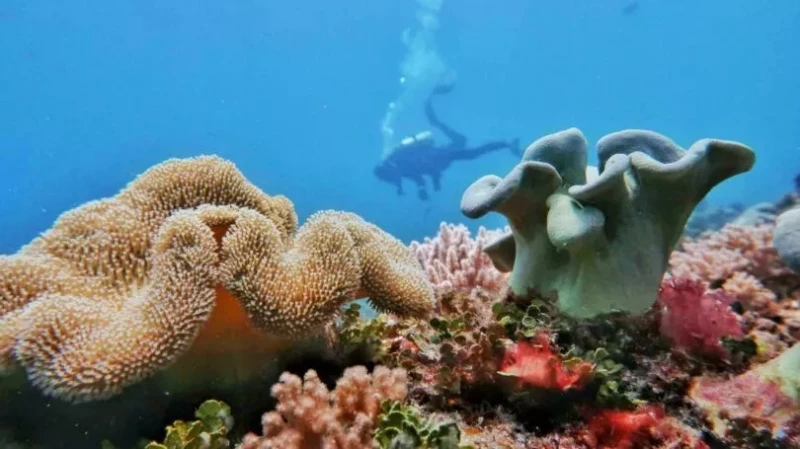
Zanzibar is renowned for its crystal-clear waters and rich marine life, making it an ideal destination for scuba diving and snorkeling. Here is some information about these activities in Zanzibar:
Scuba Diving:
-
Diving Sites: Zanzibar offers a variety of diving sites suitable for all levels, from beginners to experienced divers. Some popular sites include Mnemba Atoll, Kizimkazi, and Leven Bank.
-
Marine Life: The waters surrounding Zanzibar are home to diverse marine life, including turtles, sharks, rays, nudibranchs, and a multitude of colorful tropical fish.
-
Visibility: Underwater visibility is generally excellent, providing optimal conditions for observing coral reefs and marine life.
-
Dive Centers: There are several professional dive schools in Zanzibar. Qualified instructors can guide you on excursions tailored to your skill level.
-
Wrecks: Some dive sites feature interesting wrecks, adding an extra dimension to the diving experience.
Snorkeling:
-
Snorkeling Sites: Ideal snorkeling spots include Nungwi Beach, Kendwa Beach, and Mnemba Atoll. These sites offer shallow waters rich in marine life.
-
Snorkeling Gear: If you don't have your own equipment, many dive centers and resorts offer snorkeling gear rental.
-
Menai Bay Lagoon: This area is known for its calm waters, making it an excellent spot for snorkeling. You can find schools of colorful fish and vibrant corals.
-
Dolphin Encounters: Some snorkeling excursions include encounters with dolphins in Kizimkazi. Ensure you choose operators who follow ethical guidelines for dolphin interaction.
-
Safety: Whether diving or snorkeling, always follow safety guidelines provided by local professionals. Safety is a priority.
Whether you're a beginner or an experienced diver, Zanzibar provides an exceptional underwater experience with its pristine coral reefs and diverse marine life. Remember to check weather conditions before heading out and choose reputable operators for your aquatic activities.
 Our tips for getting the most out of your experience.
Our tips for getting the most out of your experience.
Scuba Diving:
-
Choose a Dive Center: Select a reputable and professional dive center with qualified instructors. Read reviews and ensure the center adheres to safety standards.
-
Certification: If you are not certified, consider taking a Discover Scuba Diving course. For certified divers, bring your diving card.
-
Equipment: Ensure that the scuba diving equipment is in good condition. If you have your own gear, check it before your trip.
-
Dive Planning: Discuss with instructors to plan dives suitable for your experience level. Some sites are more suitable for beginners, while others cater to experienced divers.
-
Weather Conditions: Check weather conditions before heading out. Unstable weather can affect visibility and safety.
Snorkeling:
-
Choose Snorkeling Sites: Opt for snorkeling sites that match your swimming skills. Some locations offer calm and shallow waters, ideal for beginners.
-
Snorkeling Gear: If you don't have your own equipment, check the quality of the snorkeling gear provided by the dive center or resort.
-
Local Guides: If possible, go for guided snorkeling tours with local guides. They know the area well and can show you the best spots.
-
Code of Conduct: Respect the code of conduct towards marine life. Avoid touching or disturbing corals and marine creatures.
-
Sun Protection: Apply environmentally friendly sunscreen to protect your skin while preserving coral reefs.
-
Marine Ecology: Learn about local marine ecology. Having a basic understanding can enhance your snorkeling experience.
-
Safety: Always remain vigilant at sea. Swim with a buddy, follow guide instructions, and be aware of your surroundings.
By following these tips, you can make the most of your scuba diving and snorkeling activities in Zanzibar, discovering the underwater beauty of this exceptional destination.
9 - Kizimkazi village
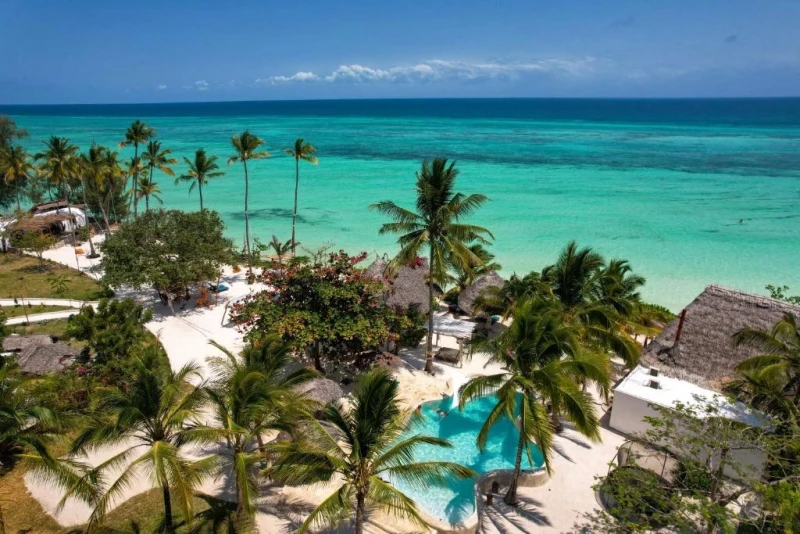
Kizimkazi is a coastal village located on the southern coast of Zanzibar Island in Tanzania. Here are some key points about the village of Kizimkazi:
-
Location: Kizimkazi is situated along the Indian Ocean on the southern coast of Zanzibar. It is known for its pristine beaches and calm waters.
-
Population: The village is home to a mixed population, primarily consisting of local fishermen. Some residents are also involved in the tourism industry due to the area's popularity.
-
Fishing: Kizimkazi is renowned as a fishing village. Traditional dhows (wooden boats) can be seen lining the beach, ready to set sail for fishing expeditions.
-
Dolphins: The region is known for dolphin encounters. Boat excursions are organized from Kizimkazi for dolphin watching in their natural habitat.
-
Kizimkazi Mosque: The village is home to an ancient mosque, often visited by tourists. This mosque is known for its history and architecture.
-
History: Kizimkazi has a rich history and has been a center of activity since the early days of coastal trade on the island.
-
Tourist Activities: In addition to dolphin-watching excursions, Kizimkazi offers activities such as snorkeling, boat rides, and relaxation on the peaceful beaches.
-
Local Culture: Visitors can get a glimpse of the daily life of Kizimkazi residents by exploring the village. The locals are often welcoming to curious visitors.
-
Preserved Nature: The surrounding area is characterized by preserved nature with white sandy beaches, coconut groves, and a tranquil atmosphere.
-
Sunset Views: Kizimkazi's beaches often provide spectacular views of the sunset. It is a peaceful spot to unwind and appreciate the natural beauty.
Whether it's exploring local culture, engaging in marine activities, or simply relaxing on the beaches, Kizimkazi offers a tranquil getaway away from urban hustle and bustle.
 Our tips for getting the most out of your experience.
Our tips for getting the most out of your experience.
To make the most of your visit to Kizimkazi village in Zanzibar, here are some useful tips:
-
Dolphin Encounter: If you plan on a dolphin-watching excursion, choose operators who adhere to ethical guidelines for dolphin interaction. Avoid practices that may disturb the animals.
-
Selecting Excursions: Compare different excursions offered in the village. Some operators may provide more personalized experiences or less crowded itineraries.
-
Mosque History: If you visit Kizimkazi Mosque, respect local rules regarding modest clothing. Additionally, learn about the history of the mosque before your visit.
-
Exploring the Village: Take a stroll through the village to discover local daily life. Be respectful to the residents, and ask for permission before taking photos, especially in sensitive areas.
-
Local Activities: Try to participate in local activities offered by the residents. This could include demonstrations of traditional fishing, visits to local homes, or craft workshops.
-
Sunset Viewing: Don't miss the sunset if you are at Kizimkazi Beach. It's often a beautiful time to enjoy the tranquility of the place.
-
Environmental Respect: Be mindful of the impact of your visit on the local environment. Avoid leaving behind waste and follow principles of responsible tourism.
-
Learning the Culture: Learn a few basic words in Swahili, the local language, to enhance your interaction with the residents and show respect for their culture.
-
Sea Safety: If you're participating in water activities, make sure to follow safety instructions provided by local operators. Sea safety is essential.
-
Visit Planning: If you have specific points you want to see or particular activities you'd like to do, plan your visit accordingly. This can help you maximize your time on-site.
By following these tips, you can fully enjoy your visit to Kizimkazi, discovering the local culture, interacting with residents, and contributing to environmentally friendly tourism.
10 - Deep sea fishing
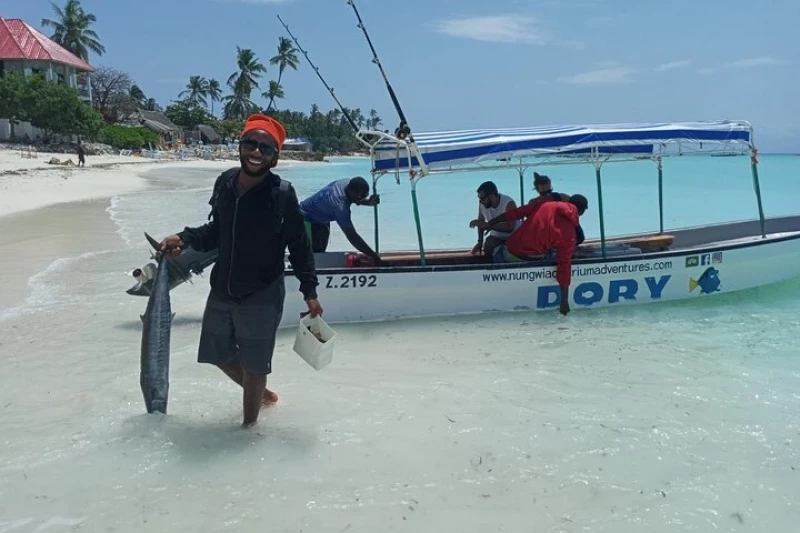
Deep Sea Fishing in Zanzibar:
Deep-sea fishing in Zanzibar is an exhilarating experience, providing sport fishing enthusiasts with the opportunity to catch impressive marine species. Here are some insights and tips for deep-sea fishing in Zanzibar:
-
Targeted Species: The waters surrounding Zanzibar are rich in sought-after fish species, including tuna, marlin, barracuda, wahoo, and dorado. Anglers often set out in search of these species.
-
Best Seasons: Deep-sea fishing in Zanzibar is practiced year-round, but certain periods are considered more favorable. The period from December to March is often regarded as excellent for marlin and tuna fishing.
-
Boat Charters: To enjoy deep-sea fishing, book a boat charter with experienced captains. Many hotels and local operators offer fishing excursions.
-
Fishing Equipment: Deep-sea fishing boats in Zanzibar are typically well-equipped with heavy-duty fishing rods, quality reels, and all necessary gear. You can bring your own equipment if you prefer.
-
Fishing Techniques: Trolling, where lures are trailed behind the boat, is a common fishing technique. Some anglers also use live bait to attract fish.
-
Adhering to Regulations: Ensure you know and comply with local fishing regulations and catch quotas to contribute to the conservation of marine resources.
-
Sun Protection and Hydration: As deep-sea fishing can involve long hours on the water, make sure to bring adequate sun protection and enough water to stay hydrated.
-
Local Experience: Take the opportunity to learn more about local fishing techniques and exchange stories with local fishermen for a richer experience.
-
Photography and Release: If you don't plan to consume the caught fish, consider practicing catch and release. Take photos, measure if possible, and then release the fish back into the sea.
-
Weather Conditions: Check the weather conditions before embarking on a fishing excursion. Unstable conditions can impact the fishing experience.
Whether you're a novice or an experienced angler, deep-sea fishing in Zanzibar offers an unforgettable marine adventure. Ensure you choose reputable and environmentally conscious operators for a positive fishing experience.
 Our tips for getting the most out of your experience.
Our tips for getting the most out of your experience.
Tips for Deep Sea Fishing in Zanzibar:
-
Choose the Right Time: Consult local experts or fishing operators to determine the optimal seasons for deep-sea fishing. Some periods may be more conducive to catching certain species.
-
Fishing Operators: Choose well-established and reputable deep-sea fishing operators. Look for online reviews and ask for local recommendations to find experienced guides.
-
Quality Equipment: Ensure that the fishing equipment provided by the operator is of high quality. If you're bringing your own gear, make sure it's suitable for deep-sea big game fishing.
-
Knowledge of Fishing Techniques: Familiarize yourself with different deep-sea fishing techniques, such as trolling, rod and reel fishing, or bottom fishing. Some fish respond better to specific techniques.
-
Adherence to Fishing Rules: Learn about local fishing regulations and adhere to catch quotas. Conservation of marine resources is essential for sustainability.
-
Be Ready for Adventure: Deep-sea fishing can be an exciting adventure, but be prepared to face variable weather conditions at sea. Bring appropriate clothing and be ready to tackle the challenge.
-
Photography and Release: If practicing catch and release, have a camera ready to quickly take photos before releasing the fish. This contributes to the preservation of fish populations.
-
Keep an Open Mind: Be prepared to enjoy the experience, even if the catch is not guaranteed. Deep-sea fishing can be unpredictable, but the excitement often lies in the unknown.
-
Communication with the Crew: Stay in constant communication with the boat crew. Follow the advice of the crew, who have in-depth knowledge of local waters and fishing habits.
-
Sharing the Experience: Share your experience with other anglers and locals. Exchange stories and tips to enrich your understanding of local fishing.
By following these tips, you can maximize your chances of success and fully enjoy the experience of deep-sea fishing in Zanzibar.
11 - Sauti za Busara Festival
The Sauti za Busara Festival in Zanzibar offers a unique experience for enthusiasts of African music and culture. If you're considering making this festival the theme of your trip, here are some aspects to consider:
-
Festival Dates: Check the official festival website for the specific dates of the event. Plan your trip around these dates, considering travel days before and after the festival.
-
Tickets and Accommodation: Purchase your festival tickets in advance and book accommodation in Stone Town, where the festival takes place. Accommodations can fill up quickly during the event.
-
Cultural Program: Explore the festival's cultural program, which goes beyond music. Some festivals offer workshops, forums, and special events highlighting local and African culture.
-
Musical Exploration: Take advantage of the musical diversity offered by the festival. Discover traditional, fusion, and contemporary African musical genres. Attend live performances for an immersive experience.
-
Local Encounters: Engage with the local population and fellow festivalgoers. Festivals are often opportunities for cultural exchange and networking, allowing you to connect with like-minded individuals.
-
Local Cuisine: Explore the local cuisine in Zanzibar. Enjoy food stalls during the festival to taste traditional and international dishes.
-
Exploration of Stone Town: Make the most of your stay in Zanzibar by exploring Stone Town, with its winding alleyways, vibrant markets, and rich cultural heritage.
-
Photography: Capture the essence of the festival by taking photos. Respect festival photography rules and ask for permission before photographing individuals.
-
Respect for Traditions: Respect the local traditions of Zanzibar, which has a rich cultural history. Dress modestly, respect religious practices, and be aware of local customs.
-
Travel Planning: Plan your trip to include leisure time before and after the festival to explore the island, relax on the beaches, and discover other aspects of Zanzibar.
The Sauti za Busara Festival offers an immersive experience in African music and culture. By incorporating these aspects into your trip, you can create an adventure rich in discoveries and encounters.
Zanzibar - Where to Stay?
Zanzibar offers a variety of accommodation options to cater to diverse traveler preferences and budgets. Here are some suggestions on where to stay in Zanzibar based on different preferences:
-
Stone Town: For a cultural and historical experience, Stone Town is an excellent choice. You'll find charming hotels in historic buildings, guesthouses, and boutique hotels. It's ideal for exploring narrow streets, local markets, and historical sites.
-
Nungwi: If you're looking for beautiful beaches and crystal-clear waters, Nungwi, located in the north of the island, is an excellent option. It's one of the most popular beach destinations, offering luxury resorts, more affordable hotels, and a lively atmosphere with beachfront bars and restaurants.
-
Paje: Situated on the east coast, Paje is renowned for its white sandy beaches and shallow waters, making it a popular choice for kite-surfing enthusiasts. Accommodation options range from luxury resorts to more laid-back establishments.
-
Kendwa: Located north of Nungwi, Kendwa also features stunning beaches and a relaxed atmosphere. It's slightly quieter than Nungwi but still offers a variety of accommodation options, including beachfront bungalows.
-
Jambiani: If you're seeking a tranquil spot on the east coast, Jambiani is an interesting option. It offers a laid-back atmosphere, peaceful beaches, and a range of accommodation, from guesthouses to eco-lodges.
-
Matemwe: For a more secluded experience, Matemwe on the northeast coast is known for its peaceful beaches. You'll find charming lodges offering a tranquil getaway.
-
Kizimkazi: If you're interested in dolphin watching, Kizimkazi, located on the southwest side of the island, is a good choice. It's a quiet area with diverse accommodation options, from resorts to guesthouses.
When searching for accommodation in Zanzibar, consider your personal preferences, the type of experience you're seeking, and your budget. Whether you prefer the historical charm of Stone Town, the lively beaches of the north, or the tranquility of secluded shores, Zanzibar offers a variety of options to suit different tastes.
Zanzibar - How to get around?
Getting around Zanzibar can be done in various ways depending on your needs, budget, and itinerary. Here are some transportation options in Zanzibar:
-
Taxis: Taxis are available in Stone Town, tourist areas, and at airports. Make sure to agree on the fare before starting your journey, as taxis typically do not have meters. You can also hire a taxi for a full day for excursions or longer trips.
-
Daladalas: Daladalas are local minibusses that provide public transportation between different parts of the island. They are often cheaper than taxis but can be crowded, and schedules may be flexible. It's an interesting option for budget travelers looking to experience local transportation.
-
Boda-bodas: Boda-bodas are motorcycle taxis. They are commonly used for short rides and can be a quick option for getting around urban areas or reaching places less accessible by car.
-
Rental Cars: If you prefer to explore the island independently, you can rent a car. Main roads are generally in good condition, but secondary roads may be bumpy. Make sure to have an international driver's license and a good understanding of local driving rules.
-
Tuk-tuks: Tuk-tuks are three-wheeled vehicles that are popular in some parts of the island, especially in Stone Town. They are often used for short trips and can be a cost-effective option.
-
Bicycles: For a more active experience, some areas of the island are conducive to cycling. You can rent bicycles in certain locations and explore the surroundings at your own pace.
-
Hotel Transfers: Many hotels offer transfer services from airports or ports to their establishments. Make sure to check if your accommodation provides this service.
It's important to note that traffic conditions may vary, and transportation options can be limited in some parts of the island. Plan your travels considering the distance between the places you want to visit and choose the mode of transport that best suits your needs.
Zanzibar - Best period
The best time to visit Zanzibar depends on your preferences for climate and activities. Generally, Zanzibar has a tropical climate with pleasant temperatures throughout the year. However, there are seasonal variations that can impact your travel experience. Here are some factors to consider when deciding when to visit Zanzibar:
-
High Season (June to October): This is the dry season in Zanzibar, with pleasant temperatures, minimal rainfall, and sunny days. It's an ideal period for beach activities, safaris, and exploring the island. Temperatures typically range between 25°C and 30°C.
-
Light Rainy Season (November to December): Although this is the small rainy season, the showers are often brief, and rain usually does not significantly interfere with activities. It remains a pleasant time to visit, with mild temperatures.
-
Heavy Rainy Season (March to May): This period experiences more substantial rainfall, sometimes in the form of continuous showers. Some activities may be affected, but the lush vegetation and potentially lower accommodation rates can be appealing. Temperatures remain warm.
-
Intermediate Season (January to February): These months fall between the two rainy seasons. While you may encounter some showers, the weather is generally stable. Temperatures are warm, making January and February a popular time to visit.
Overall, the high season from June to October is often recommended for fully enjoying Zanzibar, but other times can also offer pleasant experiences depending on your personal preferences. If you want to avoid crowds and benefit from lower accommodation rates, the intermediate season might be a good option. If you are flexible and willing to deal with some rainfall, even the rainy season can be an interesting time to visit.

